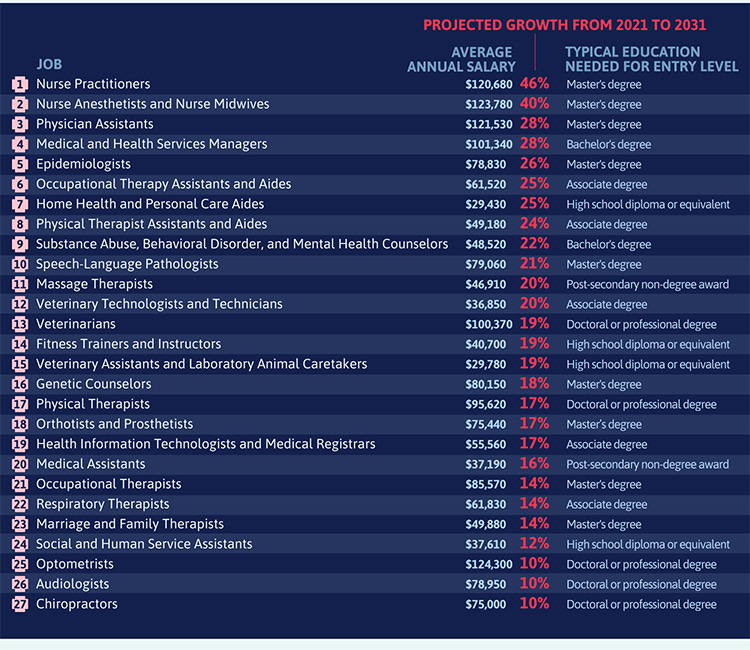Military programs expand access to healthcare training as major funding deadlines await Congress
Plus: The coolest infographic yet for folks considering careers in healthcare
While we watch to see what kind of unnecessary drama unfolds in Congress as lawmakers reconvene next week to debate federal spending bills and re-authorizations for crucial health programs, the Biden administration is nudging the expansion of healthcare workforce programs for military veterans and spouses.
Lawmakers soon return to D.C. facing a hefty to-do list, with several health programs expiring Sept. 30 — and only 11 work days for both chambers before the deadline, explains Roll Call. “Looming expirations include laws to fund the government and community health centers, reauthorize emergency response and pandemic preparedness programs and renew substance use and mental health aid.”
(I will keep y’all updated on what Congress passes and the potential impacts to Americans’ healthcare and the workforce crisis, in future issues of this newsletter.)
Meanwhile, a White House initiative designed to help veterans access credentialing and career training programs announced this week that it is adding healthcare to its short list of targeted industries.
Officials from Task Force Movement said their program will help prepare veterans and military spouses for some of the 2 million-plus unfilled health and human services jobs across the country, through new hiring, training and outreach efforts. Task Force Movement has been helping veterans and military spouses earn credentials and land career roles in the trucking and cybersecurity industry, since the initiative launched last year.
“Task force officials said they’ll look for ways to fill (nursing workforce shortages) through new training programs, more targeted hiring of military family members with existing training, and long-term planning with industry leaders on personnel management,” the Military Times reported.
Military Spouses’ Career Training Scholarships Expanded
Spouses of military service members already have access to scholarships for new career certifications, licensing, or associate’s degrees for good-paying jobs in a long list of high-demand industries, including dozens of careers in health and human services, through the Department of Defense’s My Career Advancement Account scholarship program.
MyCAA has expanded eligibility recently to try to boost the healthcare workforce pipeline; MedCerts, this newsletter’s sponsor, is one of several online career training and certification partners of the MyCAA scholarship program. Find more info on scholarship eligibility in this MyCAA fact sheet.
Awesome Infographics for the Win
Data from the Bureau of Labor Statistics can be overwhelming. OK, it IS overwhelming, for even the sharpest data and economy-focused journalists. A new infographic on the U.S. Career Institute website offers a more-digestible look at healthcare employment trends, showcasing the fastest-growing healthcare jobs and what the average salary and education requirements are for each.
(PS: The graphic is a long, tall drink of data. Scroll down! There’s more good stuff under it!)
A related post from DailyInfographic.com includes a concise overview of the top 7 jobs on the list, explaining in plain language what each role entails.
For example, their explanation of what an epidemiologist does: “Epidemiologists are the health care professionals who study the causes of disease and injury in a population. They’re needed to investigate outbreaks of disease, and they also predict future health risks that can be prevented. Some epidemiologists work in public health agencies, while others work at universities or private research institutes. Epidemiology has become an increasingly important field with an expanding role in finding ways to prevent illness and disease through more effective screening programs as well as improved treatments for existing conditions such as cancer or heart disease.”
(Real talk for the win, y’all. I’m not sure how healthcare organizations and workforce planners expect to attract high-schoolers or lower-income adults into healthcare career training programs when most of their recruiting and marketing content could pass for Wall Street Journal articles… Read the room, people.)
And in case you’re more of a list person, here’s the “list” portion of that graphic:
The data typed out, for the Readers out there: Fast-Growing Healthcare Jobs Ranked By Salary
Here are the 15 highest-paying healthcare jobs based on average annual salary that also are among the fastest-growing medical jobs, according to the BLS:
Optometrist — $124,300
Nurse anesthetist and nurse midwife — $123,780
Physician assistant — $121,530
Nurse practitioner — $120,680
Medical and health service manager — $101,340
Veterinarian — $100,370
Physical therapist — $95,620
Occupational therapist — $85,570
Genetic counselor — $80,150
Speech-language pathologist — $79,060
Audiologist — $78,950
Epidemiologist — $78,830
Orthotist and prosthetist — $75,440
Chiropractor — $75,000
Respiratory therapist — $61,830
Don’t love the idea of spending two or four years at college before you can start a healthcare career?
No problem; the report offers something for everyone:
“The top-paying healthcare job with a high school diploma is a fitness trainer or instructor, with an average annual salary of $40,700. … Social and human service assistants make slightly less, at $37,610.”
Shout-out to Healthcare Workforce Report sponsors
The Healthcare Workforce Report newsletter is generously supported by MedCerts.
For information on supporting HWR, email HealthcareWorkforce@substack.com.







